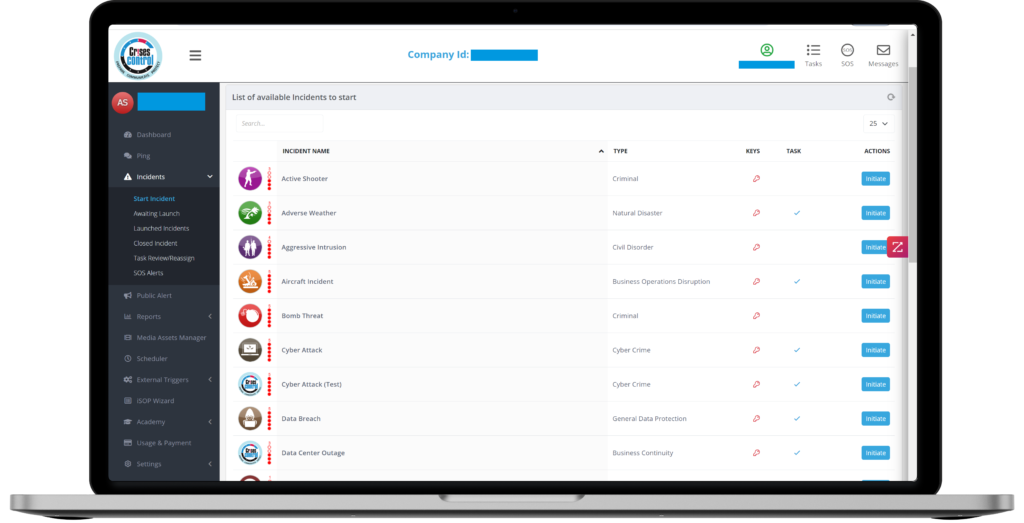Written by Shalen Sehgal | CEO
Every business faces risks that could disrupt operations—whether it’s a data breach, a natural disaster, or a sudden regulatory change. For companies operating in regulated industries like healthcare, finance, or energy, these disruptions come with an added challenge: ensuring compliance amidst the chaos.
When compliance is neglected during a crisis, businesses can face serious consequences such as fines, operational shutdowns, or damaged reputations. That’s why building compliance into your business continuity strategy is essential.
This is where Business Continuity Management Software (BCMS) with compliance tracking becomes invaluable. In this blog, we’ll explore the critical role of compliance in business continuity and how tools like Crises Control’s BCMS can simplify this process, helping your business stay on track even during tough times.
Why Compliance is Critical for Business Continuity: Beyond Risk Mitigation
When you think about Business Continuity, your first thoughts likely go to risk management—identifying potential threats, creating response plans, and ensuring smooth operations during disruptions. But what about compliance?
At its core, compliance means adhering to the laws, regulations, and standards that govern your industry. These rules differ depending on your location, industry, and the nature of your business, and they can include anything from data protection regulations (like GDPR and HIPAA) to workplace safety laws.
Failing to comply, especially during a crisis, can have severe consequences. For example:
- Legal and Financial Penalties: Imagine your company experiences a data breach during a cyberattack. If you fail to meet data protection requirements like GDPR, you could be hit with hefty fines on top of dealing with the breach itself.
- Reputation at Risk: Non-compliance can tarnish your company’s reputation, making recovery even harder after a crisis. Customers, investors, and partners may lose trust if they feel your business can’t manage its legal obligations.
- Loss of Operational Licences: In some highly regulated industries like healthcare or finance, non-compliance could mean losing the licences that allow you to operate.
In short, compliance isn’t just a legal requirement—it’s a vital part of your organisation’s survival and growth. Yet, during crises, ensuring compliance is often challenging, particularly for businesses still relying on manual processes.
The Challenge of Manual Compliance Tracking in a Crisis
During a crisis, most companies focus all their efforts on maintaining operations and managing immediate threats. But this often leaves compliance on the back burner, which can lead to overlooked regulations and costly mistakes.
Here are the key challenges companies face when they rely on manual compliance tracking during a crisis:
- Resource-Intensive Processes: Manually tracking regulations, maintaining records, and ensuring compliance audits are up-to-date requires a lot of resources. During a crisis, these resources are often redirected to other priorities, leaving compliance efforts stretched thin.
- Higher Risk of Human Error: In high-stress situations, human error becomes more likely. Employees focusing on crisis management may accidentally skip critical compliance steps, such as updating health and safety protocols or filing timely reports with regulators.
- No Real-Time Monitoring: In a crisis, regulations can change quickly. For instance, during the COVID-19 pandemic, workplace safety guidelines were updated frequently. Relying on manual processes makes it nearly impossible to stay on top of these changes in real-time, which increases the risk of non-compliance.
These challenges are more than just inconveniences—they represent serious risks to your business. Fortunately, there’s a better way to manage compliance, even in the midst of disruption.
How Business Continuity Management Software Simplifies Compliance Tracking
A robust Business Continuity Management Software (BCMS) automates compliance tracking, enabling businesses to stay compliant without adding to the stress of managing a crisis. Let’s explore how BCMS simplifies compliance in ways that manual processes simply can’t.
1. Real-Time Compliance Monitoring
Regulatory requirements aren’t static. They change frequently, especially during global events like pandemics or cyberattacks. With BCMS, you get real-time compliance monitoring that keeps track of these regulatory updates relevant to your business and industry.
For example, Crises Control’s platform allows you to track and manage compliance tasks based on the latest laws and regulations relevant to your industry. Whether it’s a new data privacy regulation or an updated workplace safety guideline, you can set the system to remind and alert you about key updates. This ensures that, even during a crisis, you stay organised and on top of compliance without scrambling to keep up with changes.
2. Automated Audit Trails and Reports
Preparing for regulatory audits is one of the most time-consuming aspects of compliance. Manually compiling reports and logging actions leaves room for error, and in a crisis, these tasks often get deprioritised.
Crises Control’s BCMS automatically logs every action related to compliance, creating an audit-ready trail. All your compliance actions—whether it’s a safety inspection, data protection protocol update, or risk mitigation step—are logged and stored securely. This ensures that, even during a crisis, you’re always prepared for an audit, without having to rely on manual record-keeping.
3. Alerts and Notifications for Compliance Tasks
Imagine you’re in the middle of managing a crisis and suddenly realise a critical compliance task was missed—like submitting a required report or updating safety protocols. This could have serious consequences.
BCMS takes this pressure off your team by automating alerts and notifications for compliance-related tasks. If something’s overdue, you’ll get a reminder. With Crises Control, you’ll receive notifications to ensure that important deadlines, reports, and regulatory updates are never missed, no matter how busy things get.
4. Customisable to Industry-Specific Regulations
Different industries have different compliance requirements. A one-size-fits-all approach rarely works when it comes to regulations. The healthcare industry, for instance, must comply with HIPAA, while financial services must follow strict data privacy laws like GDPR or Dodd-Frank.
Crises Control’s Business Continuity Management Software is customisable, meaning you can tailor it to meet the unique regulatory demands of your industry. This ensures you’re always aligned with the latest industry-specific compliance standards.
Why Compliance Tracking with Business Continuity Software is Critical for Risk Mitigation
By integrating compliance tracking with your business continuity plan, you can significantly reduce risks that might otherwise be overlooked. Here’s how compliance tracking helps mitigate risk:
- Avoid Legal and Financial Penalties: Non-compliance can lead to serious financial penalties, especially during times of crisis. Automated compliance tracking ensures that you’re always in line with regulatory requirements, avoiding fines and potential legal battles.
- Safeguard Your Company’s Reputation: A compliance failure during a crisis can lead to lasting reputational damage. Customers, investors, and partners may lose faith in your business if they perceive you as non-compliant. A system that tracks compliance in real-time helps preserve your company’s integrity.
- Ensure Smooth Operations: Compliance breaches can halt operations, causing delays that cost time and money. Business Continuity Software integrates compliance tracking with your crisis management strategy, ensuring everything keeps running smoothly, even during disruptions.
How Crises Control’s Business Continuity Management Software Can Help
At Crises Control, we know that managing compliance during a crisis can be a challenge. That’s why our Business Continuity Management Software is designed to help businesses stay compliant while managing disruptions. Here’s how we can help:
1. Integrated Compliance Tracking Tools
Crises Control’s platform helps you manage compliance by providing tools that allow you to monitor relevant regulations and industry standards in real-time. These tools ensure your business stays organised, helping you avoid missed compliance tasks, potential fines, and operational disruptions.
2. Automated Audit Trails
We generate audit-ready reports and maintain compliance logs, so you’re always prepared for regulatory reviews. This eliminates the need for manual record-keeping and reduces the risk of human error.
3. Proactive Alerts and Reminders
Crises Control sends automated alerts and reminders about compliance tasks, ensuring that no obligation is overlooked, even during an emergency.
4. Customisable for Industry-Specific Requirements
Our software is designed to adapt to your industry’s specific compliance needs. Whether you’re in healthcare, finance, or another regulated sector, Crises Control provides customisable solutions to meet your unique requirements.
Interested in our Business Continuity Management Software?
Safeguard your business and reduce downtime and mitigate risk with our crisis management solutions.

Conclusion: Elevate Your Business Continuity with Compliance Tracking
In a world where regulations can change overnight, compliance tracking is no longer an optional add-on to your business continuity plan—it’s a necessity. By integrating compliance with your Business Continuity Management Software, you can protect your business from legal penalties, safeguard your reputation, and ensure smooth operations, no matter what challenges come your way.
Don’t let compliance be the weak link in your business continuity strategy. Crises Control offers comprehensive compliance tracking tools that help you stay on top of regulatory requirements while managing disruptions.
Contact us today to get a free demo and see how our software can help your business stay resilient, compliant, and prepared for the future.
Request a FREE Demo








